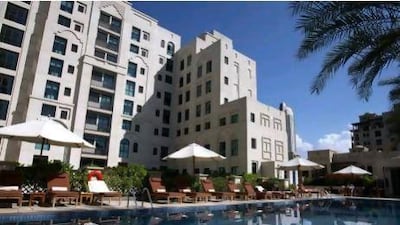Emaar Properties has acquired the management of two hotels in Downtown Dubai as it swaps housing for hospitality.
The Dubai developer of the Burj Khalifa is increasingly focusing on retail and hotel development to compensate for a slowdown in demand for properties. Emaar has assumed the day-to-day management of the four-star Al Manzil and Qamardeen hotels.
The move was intended to yoke the company closer to two of the fastest-growing sectors in the local economy, said Mohamed Alabbar, the chairman of Emaar Properties.
"Tourism and hospitality are the key growth drivers of Dubai, and over the years, we have acquired strong competencies in the hospitality and leisure sector through our world-class assets in Dubai," he said. "Our expansion to hospitality is in line with our growth strategy of creating long-term value for our stakeholders, while also contributing to Dubai's economic growth."
The two hotels were previously managed by Southern Sun Hotel Group. The management of the properties was transferred to Emaar Hospitality Group.
Emaar Hospitality currently manages five Address hotels and resorts, while Emaar also operates the Armani Hotel in the Burj Khalifa. Many of its hotels surround the Dubai Mall, which is also operated by Emaar Properties.
Revenue from the Emaar group's malls and hospitality unit accounted for 58 per cent of the group's total revenue of Dh1.8 billion (US$490 million) in the first quarter of this year.
The emirate has benefited in the past year from soaring numbers of tourists coming to the UAE as the unrest of the Arab Spring diverted many holidaymakers from traditionally popular in Egypt and Tunisia to Dubai.
The emirate reported 9 million tourist arrivals during last year, an increase of 9.6 per cent on 2010, according to data from Dubai's Department of Tourism and Commerce Marketing.
The increased focus on the Emaar group's tourism assets reflected poor levels of property sales in Dubai, still reeling from the crash of 2009, said Mohammad Kamal, a property analyst at Arqaam Capital.
"Property sales are lumpy and over the past few quarters haven't materialised in the same volumes as previously," he said.
The lack of property sales has made recurring income from Emaar's malls and hotels the core driver of its revenue and earnings, Mr Kamal added.
"In contrast, we'd expect from the second quarter onwards to see a resumption of property sales on the handover of several units domestically and in Saudi Arabia, which will tilt the balance," Mr Kamal said.
twitter: Follow and share our breaking business news. Follow us
iPad users can follow our twitterfeed via Flipboard - just search for Ind_Insights on the app.

